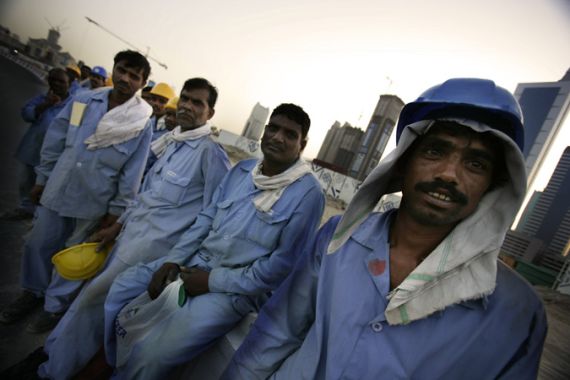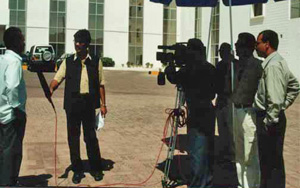Lost in the Gulf: India’s missing migrants
Pravasi Lokam, a TV show based in Kerala, India, is reuniting families with loved ones who disappeared in the Gulf.

 |
| Many migrant workers are lured to the Gulf with promises of ‘petro-dollar-lined-streets’ [GALLO/GETTY] |
For a man who carries a heavy weight on his shoulders, Rafeek Ravuther is remarkably upbeat as he shows me around his studio. For the past 11 years, he’s directed and produced a unique weekly television programme broadcast on Kairali TV, a Malayalam-language station based in Kerala, southern India.
And it was a personal tragedy that sparked his venture.
“A cousin of mine committed suicide just two days after starting a new job in Oman. Another cousin who worked in a cattle feed factory went missing for four months. I knew there would be hundreds of cases like this.”
He was wrong: It turns out there are thousands of such stories.
Pravasi Lokam or “Migrants World” is part reality show, part investigative journalism and part community activism. The simple premise is to help families in Kerala find their missing relatives, most of who went to work abroad in the countries of the Arabian Gulf.
Through the stories of destitute and poverty-stricken families, the show reaches out to the vast Keralite population living in the Gulf, to help locate missing husbands, brothers, wives and sisters. Over the years the show has become compulsive viewing for millions of Keralite migrants living in Kuwait, Saudi Arabia, Qatar, Bahrain, the UAE and Oman.
Most stories revolve around trying to locate a missing husband. Huge migration flows from southern India over the past three decades, of mostly men in search of jobs, has left millions of so-called “Gulf wives” stuck in their communities, raising their children alone and entirely dependent on remittances from their overseas partners. When things go wrong, these women have nowhere to turn and no safety net to fall back on.
Rafeek says many migrants leave India without fully understanding the implications.
“It’s only when they reach [their host countries] that they realise their work and salary are not what was offered by the agent. Dejected and often physically tortured, they get into petty quarrels and leave their Arab sponsor. But without a sponsor to support their work visa, the migrant goes into hiding. And fear of humiliation and poverty prevent them from informing their people back home.”
Pravasi Lokam
 |
| Marginalisation is the root cause of the reasons migrant workers go missing in the Gulf [Al Jazeera] |
And that’s where Rafeek Ravuther and his team at Pravasi Lokam step in. Each week, they showcase two stories. They meet the family of a missing individual and try to reach out to the expatriate Keralite community in the country where that individual went missing.
The programme has 17 representatives in the Gulf who can be contacted for help. Their phone numbers and contact details are scrolled across the screen while the missing case is reported. The programme has aired more than 1,300 cases since it began, but has only been able to reunite around 320 families. Hundreds of cases are pending.
But why and how do these migrants go missing in the first place? Rafeek has seen it all over the years: Absconding husbands hiding from loan sharks; undocumented workers who get found out and go missing to avoid deportation; abused domestic workers; and migrants who are accused of a crime in their host countries and end up in jail.
Govindan Gopalakrishnan went missing for 23 years. He left Kerala for Bahrain in 1983 to work as a carpenter, but he was misled and forced to work as a domestic servant. After two years he fled his Arab sponsor and ended up working on a camel farm deep in the desert of Bahrain. But his original Arab sponsor filed charges against him and he eventually ended up in jail. It was his second employer at the camel farm that got Gopalakrishnan out of jail and took him back to work. There he stayed for years, unable to contact his family on his meagre salary or to send money home. But his problems were just beginning.
Arab sponsors are required to renew the visas of their workers every one-two years. Many sponsors deduct a small amount of money from the wages of the worker every month towards visa renewal costs. But many don’t actually bother to renew the visas. That’s exactly what happened to Gopalakrishnan.
He toiled on the camel farm every day for 19 years, not knowing he was undocumented for most of them. His second Arab sponsor at the camel farm refused to release him or to allow him to visit his family. It wasn’t until Gopalakrishnan, now in his 60s, was too old and frail that his employer decided to let him go.
Gopalakrishnan’s wife Jagathamma and their son, now 35 years old, presumed he had died, until they got a phone call from the Pravasi Lokam team in 2006.
“We are now in the process of bringing him back. Friends and well-wishers have pooled in for his air ticket. Now we have to arrange money to pay the fine,” says Rafeek. Because Gopalakrishnan’s sponsor didn’t renew his visa for years, he was undocumented and under Bahraini law, liable to pay a fine. With the help of the Keralite expatriate community, they managed to raise $4,370 needed to set him free. His employer and sponsor for the past 19 years didn’t contribute anything.
Diary of a migrant worker
 |
| The show tries to reunite families and raise funds to take care of orphaned families [Al Jazeera] |
Thanks to the help of the expatriate communities in the Gulf and a network of well-wishers and activists, the show has become a household name for millions of Keralites at home and abroad.
The show has even started to help migrants from other communities, such as Pakistani or Tamil workers. Not only does the show try to reunite families, but in the many cases where this hasn’t been possible, it will try and raise financial aid for orphaned families, sponsorship for the education of children, repatriation costs, medical treatment of accident victims, rescuing victims from sex rackets and repatriation of dead bodies.
More importantly, the show has helped educate migrants about some of the pitfalls of seeking work overseas, dispelling a widely held notion of streets lined with petro-dollars and job opportunities. It’s also prompted the Indian embassies in the Gulf to be more pro-active in protecting their citizens abroad.
As Rafeek leads me out of his edit suite where the latest episode is being put together, he tells me about his future.
He had high hopes of being a film director, and that’s what he set out to do. But then Pravasi Lokam took over his life. For 11 years, he’s nurtured the show and the people around it. Then he tells me about his latest project and his face lights up. He’s finally secured funding to make his first feature film. The actors have been hired. The location is set. The plot: The diary of a migrant worker.
He certainly has no shortage of material to work with.
Follow Bhanu Bhatnagar on Twitter: @bhanu_bhatnagar